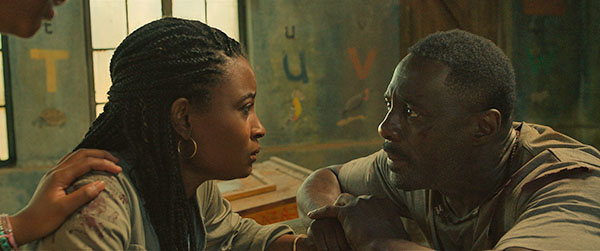Beast relies on B-movie aesthetics and Elba’s acting chops to survive, but Kormákur’s vision lacks inspiration, leaving this animal-horror thriller left for dead.
There are plenty of outstanding filmmakers whose first feature was either a B-movie or a Grindhouse flick. Filmmaker Roger Corman, called “The Pope of Pop Cinema” back in the 60s and 70s, forced the directors he’d work with to limit themselves – restraining your product so that it doesn’t show excess, aka trimming the fat. Corman mentored and gave rise to filmmakers like Francis Ford Coppola, Martin Scorsese, Joe Dante, and more. He knew what audiences wanted and delivered some of the most memorable and influential low-budget pictures (The Slumber Party Massacre, Death Race 2000, Piranha). Nowadays, plenty of filmmakers have tried their hand at doing a Corman-inspired movie, or at least one that would look the part; however, most don’t succeed because of that sense of restraint and dependence on the Hollywood-esque gloss. The latest one is Baltasar Kormákur (Everest, 2 Guns), who tries his hand at animal horror with the Idris Elba-led Beast.
The film doesn’t dwell on an exploitative nature, unlike the aforementioned ones, but does contain plenty of elements that derive from them. When I first saw the trailer, I knew precisely what it wanted to be. Although possessing a very sizable budget of almost 40 million dollars, it was a B-movie in essence, from its simple premise to its short 90-minute runtime. Beast, in a nutshell, is about a man named Dr. Nate Daniels (Idris Elba) and his daughters, Norah (Leah Jeffries) and Meredith (Iyana Halley), who are trapped in a South African reserve with a bloodthirsty lion stalking their every move.
That’s basically it in terms of plot, for better or worse. Since the movie depends on a straight-to-the-chase narrative, Kormákur had to find ways to engage the audience through its horror-action sequences or characters we would root for. The film begins with a scene that presents the idea of a rogue animal hunting people down. And it does so by implementing a “hunter becomes the hunted” scenario, as illegal hunters go face to face with a lion who’s looking for its next meal.
The movie later transitions into some character backstory dump, where the audience learns face-value details about the Daniels’s lives. After a couple of minutes, Kormákur says, “scratch all that,” and goes into the middle of the jungle to give the audience what they wanted: the lion action and thrills. Beast does deliver what it says on the tin. The film’s first sequence involving the lion (not counting the short intro scene) is shot in a way that makes the audience feel trapped with the characters – fearing for their lives, as the beast would stop at nothing for some flesh – thanks to some long takes.
The minimal editing in those sequences is what makes them tick; instead of going back and forth into shots of the humans and the lion, the camera slowly goes around the vast reserve to create a sensation of both claustrophobia and “no escape”. It is ferociously muscular, and there’s a ton of tension slowly encapsulating toward a climatic, yet expected, ending – a one-on-one fight between man and beast.

After those great moments, the film goes downhill rapidly. The rest of its sequences are presented in a trepid manner that doesn’t entertain as much as one would expect after such an exhilarating scene. The lack of suspense and popcorn movie entertainment in the rest of the picture isn’t the only problem that holds Beast back. Of course, when you are engaged with a horror movie, and the characters make stupid decisions, you react – by screaming at the screen. In Beast, the Daniels’s decisions are otherworldly ridiculous, to the point where it is face-palmingly stressful. It is tropes galore for sure, but it truly misses the mark with very poor set-ups to its animal horror thrills. Now, there’s a problem with the visual effects in the film. The lion seems too wobbly and unrealistic, like the werewolves in the Twilight franchise. Why is this a big issue? Because if the main antagonist, if you could call it such, seems remarkably unrealistic, the audience won’t fear the horrors happening during the film’s runtime.
This was sort of a problem in Dan Trachtenberg’s Prey, where, although they used a practical suit on some occasions, the Predator and animals’ visual effects felt so flimsy and shaky that they took you out of the experience for a couple of moments. However, Prey delivered proper scares and tension to mask those faults, unlike Beast. When you are worried about that minor detail instead of focusing on what’s happening on screen, it shows that the story and the way it is being presented aren’t drawing your attention. B-movies back in the day didn’t cost this much to produce.
The film reminded me of Piranha 3D, costing twenty-four million to concoct: it made its money back and more, but there was no reason for it to cost so much. Beast’s B-movie aesthetics were the things that I was looking forward to, but, in the end, they were also what disappointed me the most. The movie’s Hollywood gloss is always present, making it look crisp and “expensive”, but it loses the genre-filmmaking griminess it seemed to capture initially. Sure, Idris Elba carries the dramatic scenes with ease and slight heft, yet that isn’t enough to sustain a feature that relies on thrills and does them in an uninteresting way.
Beast is now available to watch globally in theaters.

